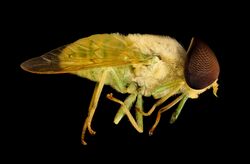Biology:Chlorotabanus crepuscularis
From HandWiki
Short description: Species of fly
| Chlorotabanus crepuscularis | |
|---|---|

| |
| Chlorotabanus crepuscularis (Green horse fly) | |
| Scientific classification | |
| Domain: | Eukaryota |
| Kingdom: | Animalia |
| Phylum: | Arthropoda |
| Class: | Insecta |
| Order: | Diptera |
| Family: | Tabanidae |
| Subfamily: | Tabaninae |
| Tribe: | Diachlorini |
| Genus: | Chlorotabanus |
| Species: | C. crepuscularis
|
| Binomial name | |
| Chlorotabanus crepuscularis Bequaert, 1926[1]
| |
| Synonyms | |
| |
Chlorotabanus crepuscularis is a species of horse flies in the family Tabanidae.[2][3] This species is the only green tabanid in North America. It can be found from Texas to Delaware. In Florida, this sanguinivorous (blood-feeding) fly is seen as an adult from March through September, but is most active from May to mid-July.
The female has the ability to sense carbon dioxide, which helps it feed on mammals, especially during the night when it is most active. The larvae are also predaceous and live in the soil adjacent to water and on floating vegetation but can also live in forest sand. The insect's blood is blue. The fly's eyes are brown, but glow yellow under 385 nm UV light.[citation needed]
References
- ↑ Bequaert, J.C. (1926). "Medical report of the Hamilton Rice Seventh Expedition to the Amazon, in conjunction with the Department of Tropical Medicine of Harvard University, 1924-1925. Part II. Medical and economic entomology". Contributions from the Harvard Institute for Tropical Biology and Medicine 4: 155-257, pls. 61-67.
- ↑ Moucha, J. (1976). "Horse-flies (Diptera: Tabanidae) of the World. Synoptic Catalogue.". Acta Entomologica Musei Nationalis Pragae Supplements 7: 1–320. https://www.aemnp.eu/data/article-975/956-7_0_7.pdf. Retrieved 11 September 2022.
- ↑ Burger, J. F. (1995). "Catalog of Tabanidae (Diptera) in North America north of Mexico". International Contributions on Entomology (Associated Publishers) 1 (1): 1–100.
Wikidata ☰ Q13494310 entry
 |

